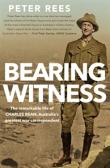 9202995217380793024.jpg
9202995217380793024.jpg
 Bearing Witness : The Remarkable Life of Charles Bean, Australia's Greatest War Correspondent
single work
Bearing Witness : The Remarkable Life of Charles Bean, Australia's Greatest War Correspondent
single work
 9202995217380793024.jpg
9202995217380793024.jpg
 Bearing Witness : The Remarkable Life of Charles Bean, Australia's Greatest War Correspondent
single work
Bearing Witness : The Remarkable Life of Charles Bean, Australia's Greatest War Correspondent
single work
'Charles Bean was Australia's greatest and most famous war correspondent. He is the journalist who told Australia about the horrors of Gallipoli and the Western Front. He is the historian who did so much to create the Anzac legend and shape the emerging Australian identity in the years after Federation. He is the patriot who was central to the establishment of one of this country's most important cultural institutions, the Australian War Memorial. Yet we know so little about him as a man. Bearing Witness rectifies that omission in our national biography.
'This is the first complete portrait of Charles Bean. It is the story of a boy from Bathurst and his search for truth: in the bush, on the battlefield and in the writing of the official history of Australia's involvement in World War I. But beyond this, it is a powerful and detailed exploration of his life, his accomplishments and a marriage that sustained and enriched him.
'Insightful, unexpected and compelling, Bearing Witness gives rich personality to a remarkable life.' (Publication summary)
Dedication:
For Sue
and in memory of my grandfather, Private James White, 7th Battalion AIF, who with his brother Fred knew the horrors of Gallipoli and the Western Front.
Epigraph:
We have followed your work, Captain Bean; you seem to have been closer to this war than most people. –Admiral Sir John Jellicoe, Commander, British Grand Fleet, 17 October 1916
He is red-hot in every attack we make, always ready to help the wounded or do anything else in that line. –General William Birdwood to Australian Governor-General Sir Ronald Munro Ferguson, 17 April 1917
I wish I could find a word about half-way between ‘prim’ and ‘prig’ and without either the unkindness or harshness that those two words connote. He did seem to me to be rather self-consciously upright and with more tolerance than understanding of the wickedness of lesser mortals such as politicians, public servants and persons who saw their responsibilities in a way different from his way. –Sir Paul Hasluck, former Australian Governor-General, 29 July 1983
I am too self-conscious t mix well with the great mass of men. –Charles Bean, 8 May 1918
'C.E.W. (Charles) Bean embarked from Melbourne in 1914, accompanying the first convoy of Australian troops to Egypt. He witnessed the Australian Imperial Force landing at Anzac Cove on 25 April 1915, and was the only war correspondent to remain at Gallipoli for the duration of the campaign. In 1916, he followed the troops to France, where he remained until the war concluded in 1918. Throughout the war, and upon his return to Australia, Bean dedicated himself to ensuring that the memory of the deeds undertaken by the Australian soldiers of the First World War would not be forgotten.' (Introduction)
'C.E.W. (Charles) Bean embarked from Melbourne in 1914, accompanying the first convoy of Australian troops to Egypt. He witnessed the Australian Imperial Force landing at Anzac Cove on 25 April 1915, and was the only war correspondent to remain at Gallipoli for the duration of the campaign. In 1916, he followed the troops to France, where he remained until the war concluded in 1918. Throughout the war, and upon his return to Australia, Bean dedicated himself to ensuring that the memory of the deeds undertaken by the Australian soldiers of the First World War would not be forgotten.' (Introduction)